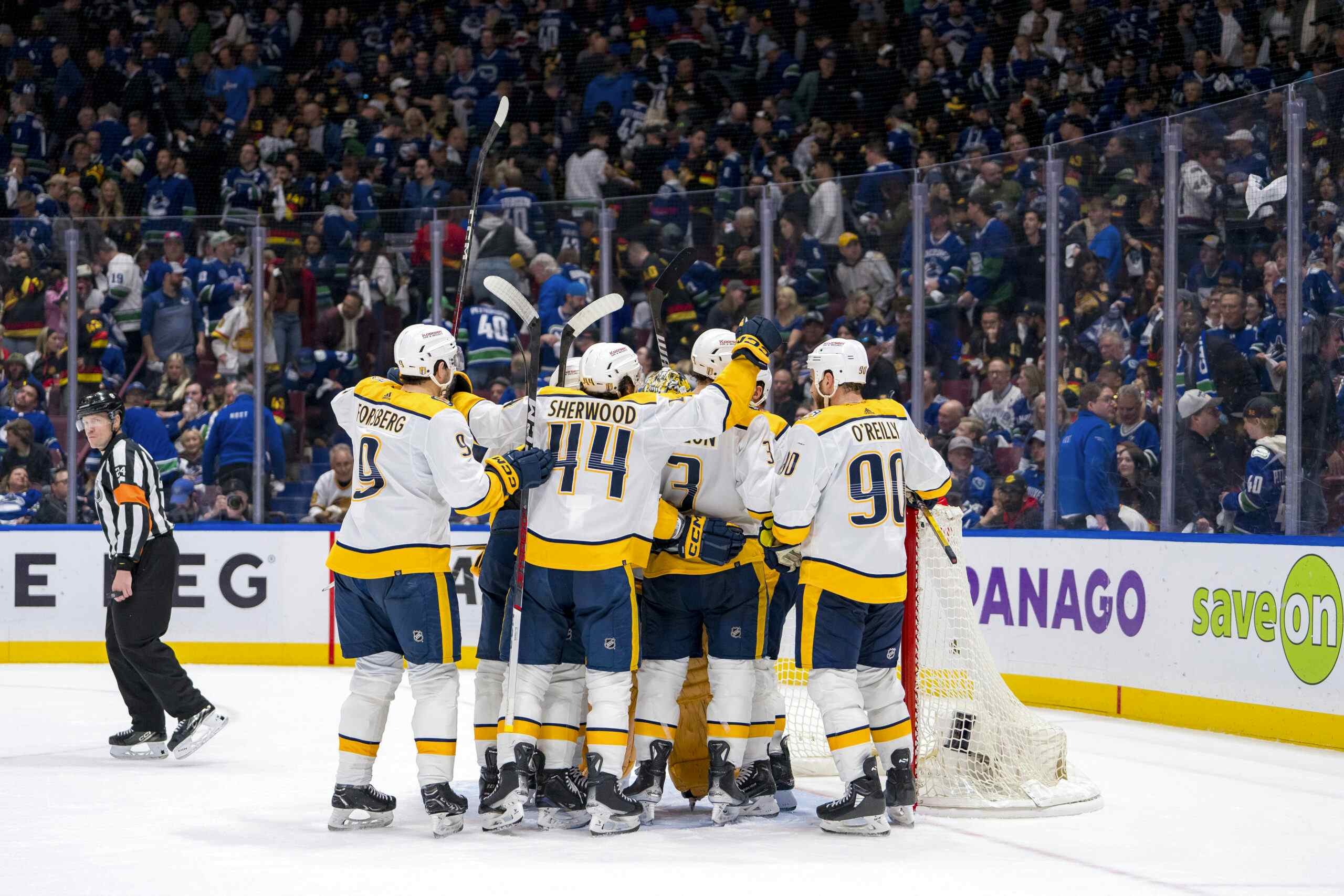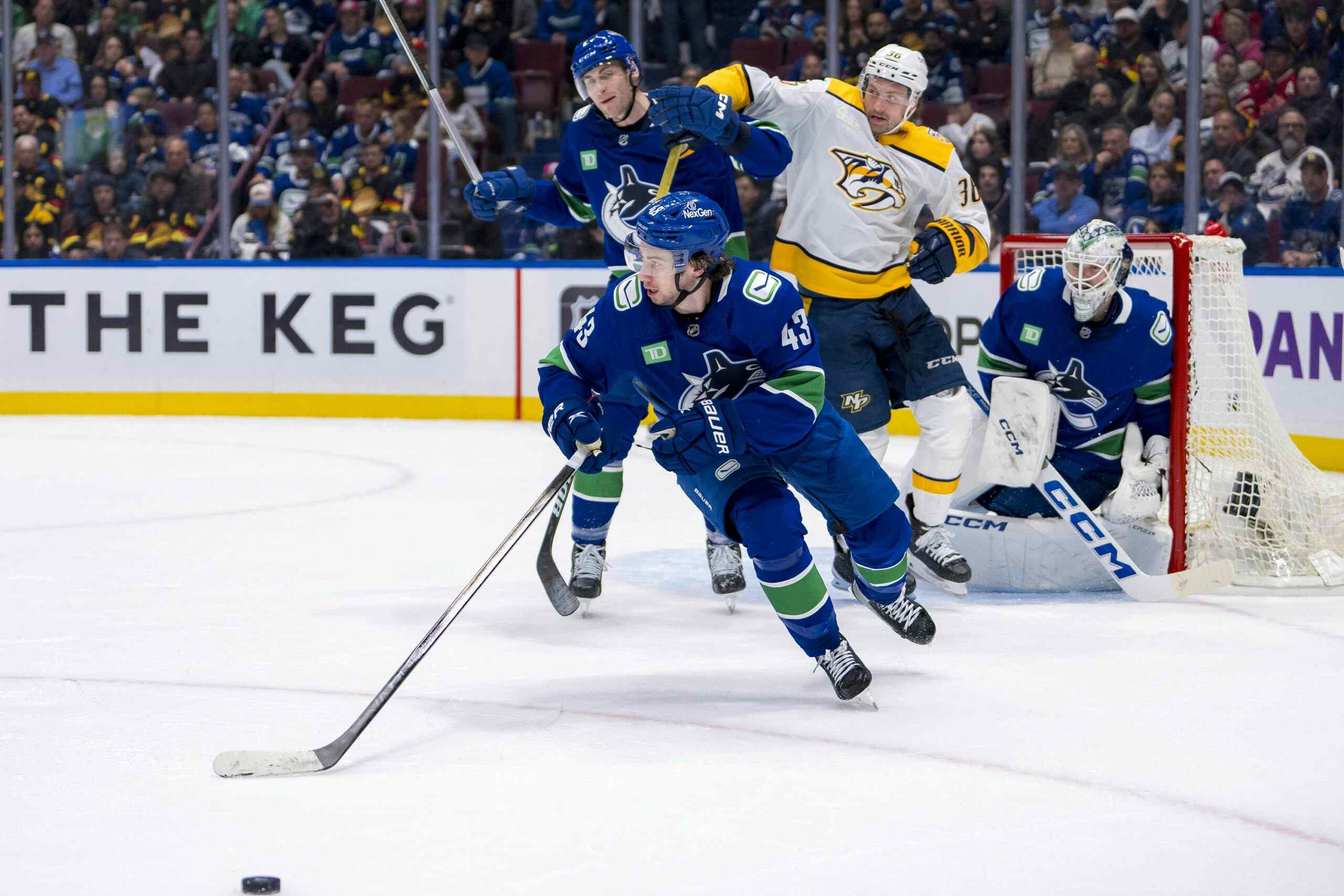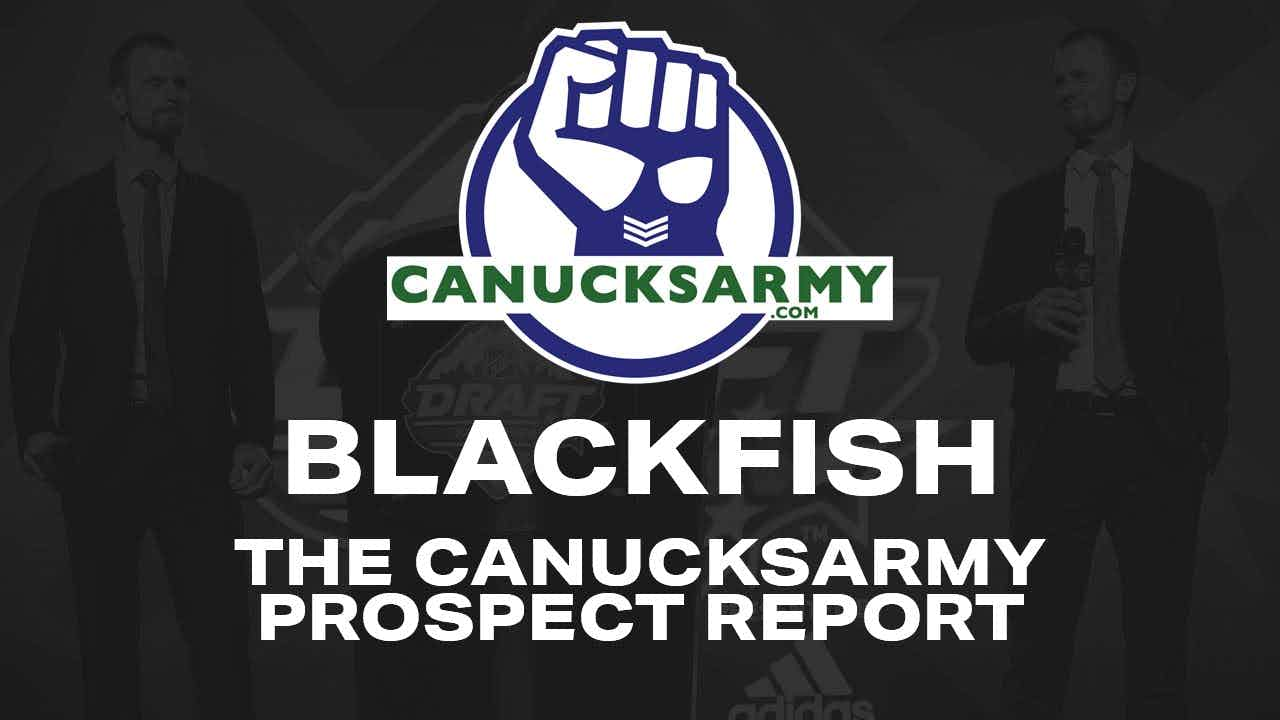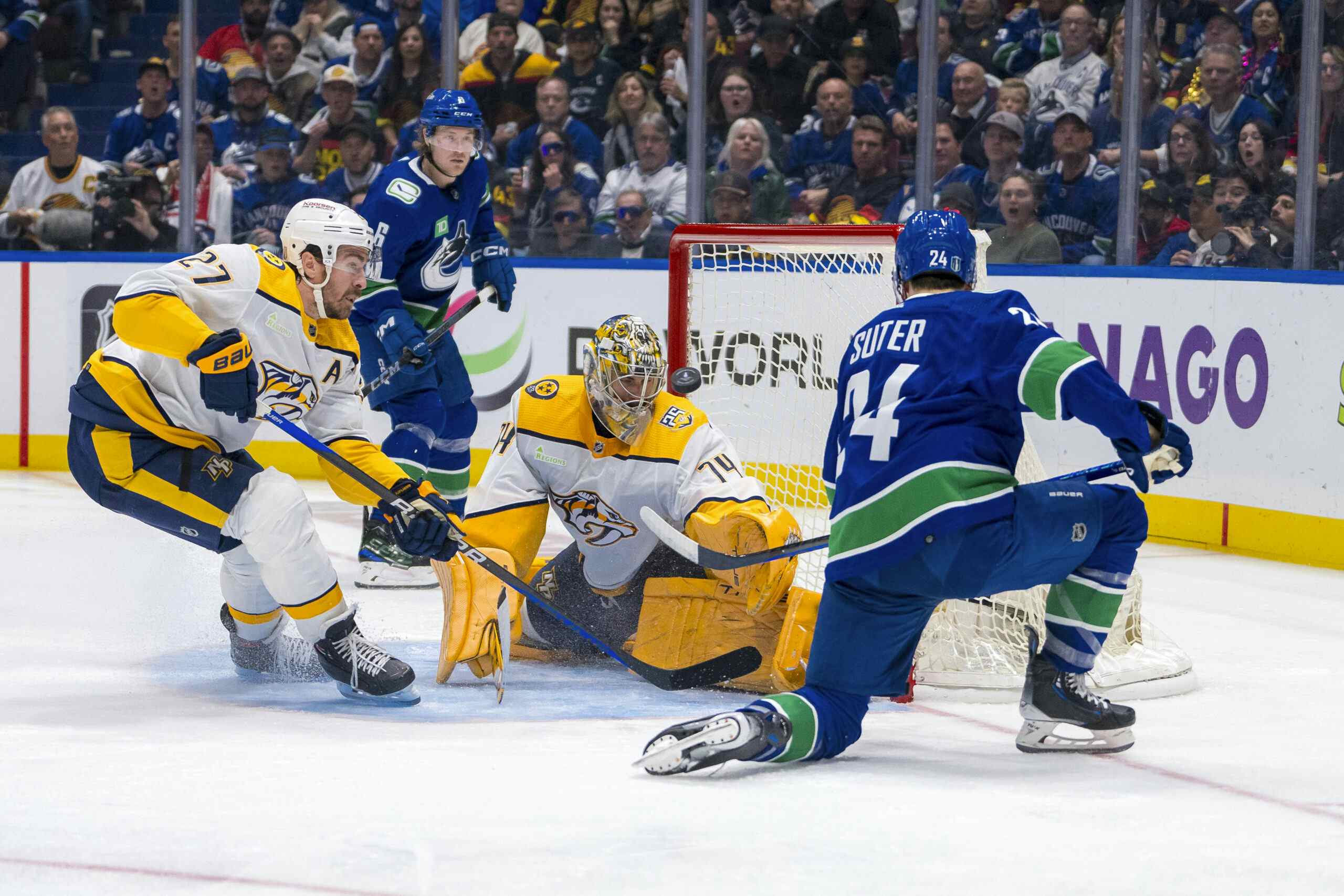Why the Canucks’ Stubbornness Could Cost them a Playoff berth
By Carol Schram
8 years ago
Photo Credit: James Guillory/USA TODAY Sports
Change is Coming.
That’s the marketing message the Vancouver Canucks used to usher in the new era of Trevor Linden, Jim Benning and Willie Desjardins during the summer of 2014.
“Trader Jim” initially lived up to the billing with his high-profile trade of Ryan Kesler and free-agent signings of Ryan Miller and Radim Vrbata. Since that first summer, bold moves have been few and far between during the frequent dark patches in the
2015-16 season.
2015-16 season.
Though they were introduced as representing a change from the ‘stay still Gill’ era, Benning and Desjardins have proven to be less-than-flexible about abandoning preconceived ideas, even when situations change or unexpected opportunities present themselves.
For all the team’s difficulties this season, Vancouver remains in the thick of the playoff hunt in the Pacific Division. A more proactive, nimble approach by Willie and Jim could help them achieve the goal they set at the beginning of the season. Here are four examples of past and current situations where their stubbornness has hurt their team.
Passive Playoff Coaching
During Desjardins’ rookie season behind the Vancouver bench, I was willing to cut him some slack for decisions like keeping Linden Vey on the first power-play unit when he was clearly ineffective in that role. I figured Desjardins was learning the ropes in the NHL and that as long as he showed signs of improvement in his decision-making over time, he was on the right track.
In my mind, the apprenticeship period ended when the playoffs rolled around. And to Willie’s credit, Vey’s role had been on the decline for awhile, to the point where he dressed for just one game in the postseason. But Willie’s determination to roll four lines kept Daniel and Henrik Sedin limited to no more than 17 minutes of ice time for the first three games against the Calgary Flames.
Only after Vancouver had fallen into a 2-1 series hole and squandered home-ice advantage did Desjardins start leaning more heavily on Daniel and Henrik. By then, it was too late—the Flames smelled blood and knew they could win, while the Canucks could only try not to lose.
If Willie had moved more quickly to dictate the tone of the series by leaning on his best players, the Canucks might have enjoyed a more favourable playoff outcome.
Loyalty to Ryan Miller
One of Benning’s first moves as Canucks GM was to sign free-agent goaltender Ryan Miller, a player he had a hand in drafting as director of amateur scouting for the Buffalo Sabres back in 1999.
For all the Canucks’ success in 2014-15, Miller was mediocre. He posted a .911 save percentage and 2.53 goals-against average in 45 appearances before tearing the MCL in his right knee on February 28.
Benning ignited an offseason wildfire when he admitted at the Canucks’ summer season ticket holder event that he’d passed on a chance to trade 35-year-old Miller and his $6-million-a-year contract. Instead, Benning dealt fan favourite Eddie Lack, whose year-end save percentage of .921 and 2.45 goals-against average were better than Miller’s and whose 11-5-2 record after Miller’s injury cemented Vancouver’s 101-point season and return to the playoffs.
If Benning had taken advantage of the opportunity to move Miler, he would have freed up
nearly $5 million in salary-cap space for this season and given Lack and Jacob Markstrom to duke it out for the No. 1 spot in
net, likely without much of a decrease in netminding quality. Miller has been pretty good behind a shaky defense, but he’s being overused and has cost his team some points.
nearly $5 million in salary-cap space for this season and given Lack and Jacob Markstrom to duke it out for the No. 1 spot in
net, likely without much of a decrease in netminding quality. Miller has been pretty good behind a shaky defense, but he’s being overused and has cost his team some points.
The low point of Miller’s season to date came on the road during
the first weekend of November. On Saturday, he handed the Buffalo Sabres a 3-2
win after failing to stop a Rasmus Ristolainen shot with 17 seconds left in the
game, then on Sunday he was outduelled by New Jersey Devils’ backup Keith
Kinkaid, dropping a 4-3 overtime decision.
the first weekend of November. On Saturday, he handed the Buffalo Sabres a 3-2
win after failing to stop a Rasmus Ristolainen shot with 17 seconds left in the
game, then on Sunday he was outduelled by New Jersey Devils’ backup Keith
Kinkaid, dropping a 4-3 overtime decision.
Throughout his career, Miller has been used to playing big
minutes. Since he joined the Canucks, the pattern has continued, even in the
face of diminishing returns.
minutes. Since he joined the Canucks, the pattern has continued, even in the
face of diminishing returns.
In early December, after Miller had posted a 2-6-2 record while playing
10 of 12 games, Benning finally started to shift his position on how much
playing time his netminders would receive.
10 of 12 games, Benning finally started to shift his position on how much
playing time his netminders would receive.
Despite the promise, not much has changed. Since December 2,
Miller has made six starts, while Markstrom has started just twice—in
games that were 12 days apart.
Miller has made six starts, while Markstrom has started just twice—in
games that were 12 days apart.
“It is a lot more challenging than I thought, coming out West,” Miller
admitted to Brad
Ziemer of the Vancouver Sun
before the Canucks took off on their latest road trip, where he has started
three of four games so far.
admitted to Brad
Ziemer of the Vancouver Sun
before the Canucks took off on their latest road trip, where he has started
three of four games so far.
Miller, 35, ranks fourth in ice time among all
goaltenders and is at risk of burning out again if the organization doesn’t
take active steps to get Jacob Markstrom into more games.
goaltenders and is at risk of burning out again if the organization doesn’t
take active steps to get Jacob Markstrom into more games.
Unwillingness to Deviate from Lineup Plans
One of the reasons why Miller was overworked at the beginning of the season was the team’s reluctance to lean on fill-in Richard Bachman while Markstrom spent the first month on the sidelines with a hamstring injury.
Bachman saw just one game of action, which came right before Markstrom was set to rejoin the team, and looked just fine in a 3-1 win over the Arizona Coyotes. Though Miller’s 4-2-4 record in October was solid, could the Canucks have benefitted over the long term if they’d been more willing to play Bachman while he was with the team?
Willie Desjardins has also been slow to make changes in how he
deploys his skaters, even when he’s not getting results. As the Canucks began to
slump in mid-November, a stagnant power play brought the same look game after
game, a penalty kill that has been among the NHL’s best for years turned
suddenly porous, and secondary scoring dried up for virtually every forward not
named Sedin or Jannik Hansen.
deploys his skaters, even when he’s not getting results. As the Canucks began to
slump in mid-November, a stagnant power play brought the same look game after
game, a penalty kill that has been among the NHL’s best for years turned
suddenly porous, and secondary scoring dried up for virtually every forward not
named Sedin or Jannik Hansen.
Many NHL coaches are unwilling to make changes to a winning
lineup, but Desjardins doesn’t make changes when the team is losing, either.
Even after Tuesday’s 6-2 blowout in Minnesota, he chose to come back with the
same 18 players two nights later in Philadelphia rather than try to shake
things up by inserting Ronalds Kenins or Andrey Pedan into the lineup.
lineup, but Desjardins doesn’t make changes when the team is losing, either.
Even after Tuesday’s 6-2 blowout in Minnesota, he chose to come back with the
same 18 players two nights later in Philadelphia rather than try to shake
things up by inserting Ronalds Kenins or Andrey Pedan into the lineup.
Unwillingness to Address Deficiencies
The Canucks are dead last in the NHL at the faceoff dot, with a success rate of just 45.9 percent. The team has been thin down the middle ever since Brandon Sutter went down with a sports hernia injury that eventually required surgery.
On December 14, Jim Benning had an opportunity to improve his team’s depth at center at a minimal cost.
Adding Stoll to the lineup would have filled an immediate need for Vancouver at center and could have helped to relieve the heavier-than-expected workload that youngsters Bo Horvat and Jared McCann have been carrying. We have also now learned that the organization knew when Stoll was on waivers that Henrik Sedin was playing through a lower-body injury.
“We talked about it, but we decided that we’re going to try and get younger,” Benning told Ben Kuzma of The Province about his decision to pass on Stoll. “He can win draws and help on the penalty kill, but we’ve got Adam Cracknell in that role and we just felt that if we’re going to pick up a guy, it’s going to be a younger (player).”
Adam Cracknell is 39.1 percent in the faceoff circle. And the Canucks have given up 15 power-play goals in 66 times shorthanded since Sutter went down—a kill rate of just 77.3 percent. These are two areas where the Canucks clearly need help, yet Benning actively chose to stay the course, apparently because he didn’t want a 33-year-old in his lineup for even a short time.
After his off-ice troubles last summer, Stoll certainly comes with some baggage, but he would have been a handy stop-gap solution at a reasonable price until Sutter gets back into the lineup. If Henrik had stayed healthy, Stoll’s presence could also have allowed the Canucks to release Jared McCann to get his confidence back as part of Team Canada’s World Junior team.
The order of priority for waiver claims is based on a team’s position in the standings, with the worst teams getting first crack at players who are placed on waivers. The Canucks could have had Stoll if they’d wanted him—he was ultimately claimed by the Minnesota Wild, who sit well above Vancouver in the standings.
Recent articles from Carol Schram
- CHRIS TANEV PRAISED BY WORLD CHAMPIONSHIP TEAMMATES FOR GOLD-MEDAL PERFORMANCE
- 1-on-1 with Jannik Hansen: on Nicklas Jensen’s growth, the Worlds and the ‘sacrifice’ of developing players at the NHL level
- Thatcher Demko interview: on turning pro, his ‘bromance’ with Jared McCann and Jim Benning’s ‘class’





